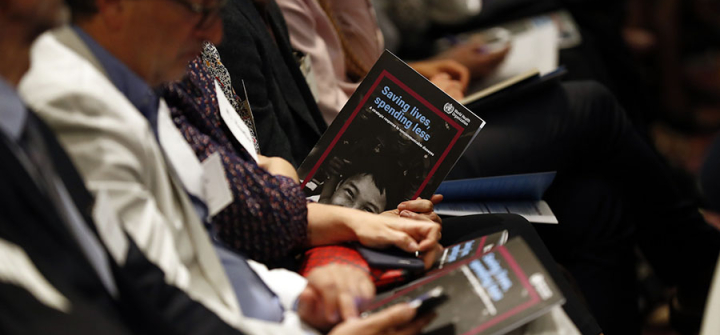WHO’s Different Calculus on NCDs: Saving Lives… and Money
GENEVA – One reason that interventions for noncommunicable diseases don’t garner sufficient global attention and funding is that counting deaths alone isn’t persuasive. 40 million NCD deaths each year is a massive tragedy, but repeatedly citing mortality data doesn’t seem to resonate with government leaders.
A new WHO report on NCDs released here yesterday tries a difference calculus. The title isn’t subtle: “Saving lives, spending less: a strategic response to noncommunicable diseases.” The report, produced with support from Bloomberg Philanthropies, argues that strategies requiring the 78 low and middle-income countries spend just an additional $1.27 per year per person would save 8.2 million lives by 2030.
And if that data point doesn’t capture finance ministers’ attention, the report goes one step further: For each $1 invested in WHO “Best Buys” for reducing NCDs would yield a return of $7 by 2030.
“Tackling NCDs makes sense any way you look at it,” said Michael R. Bloomberg, philanthropist and WHO Global Ambassador for Noncommunicable Diseases, in a video shown at the report’s release event.
The Best Buys include such low-cost strategies as tobacco taxes, restrictions on alcohol ads, education campaigns about the benefits of physical activity, etc. At the event, WHO and World Banks experts joined ministers of health from Tonga, Sri Lanka and South Africa in promoting the report’s cost-saving message.
“We feel this report makes the case that countries can’t afford not to invest in NCDs. Investing now will lead to a healthier, happier and more productive population in the future,” said Melanie Bertram, a WHO health economist. “It’s a great return on investment.”
Saia Piukala, Minister of Health for the Kingdom of Tonga, endorsed the strategy because of the expense and inaccessibility of many treatments for NCDs on small Pacific islands. “Prevention is key to our success in fighting NCDs,” Piukalala said. He cited his country’s efforts to raise taxes on tobacco by 115%, which increased the cost of a pack of cigarettes by 85%, and ban smoking public places. Tonga’s initiatives have led tobacco use prevalence to fall from 40% in 2000 to 26% in 2012. “I think that is a positive result from Best Buys in Tonga,” he said, adding that he’s awaiting results from a tobacco use survey completed last year.
Aaron Motsoaledi, Minister of Health for South Africa, echoed Piukala’s endorsement saying that Africa could not afford a “pandemic of NCDs.” Motsoaledi then sought to extend the report’s scope: “The question I want to ask is, I’m just worried I don’t see much about sugar here.”
Bertram responded by saying there weren’t any sugar interventions in WHO’s 16 Best Buys.
“Please try and find something,” Motsoaledi said. “I can assure you sugar is the new poison.”
The thought prompted him to call for a chapter about the “commercial determinants of health,” building on the theory of social determinants of health.
This prompted Piukala to riff on trade and the negative effects of cheap sugar-sweetened beverages in his country. “What is important to me is, how can sugary drinks … be cheaper than a bottle of water?” he said. He added that education campaigns can only achieve so much; taxes are needed to raise the cost of sugary drinks.
Tim Evans, senior director for Health, Nutrition & Population at the World Bank, argued that the report’s cost-saving message will need to be repeated to finance ministers who hear frequently hear similar evidence but suffer from “short term memory deficit.” They need to be told messages day after day, Evans said. However he said he has seen increasing interest on the part of finance ministers to be part of the change.
Ed Notes: See the latest news from #WHA71 here.
Want to share a #WHA71 tip or a story idea? Want to connect with GHN editor-in-chief Brian Simpson in Geneva? Please be in touch.
Michael R. Bloomberg is a benefactor of the Johns Hopkins Bloomberg School of Public Health, which publishes Global Health NOW.
Join the tens of thousands of subscribers who rely on Global Health NOW summaries and exclusive articles for the latest public health news. Sign up for our free weekday enewsletter, and please share the link with friends and colleagues: Subscribe to GHN
Audience members peruse a new WHO report on NCDs at its May 20 release in Geneva. (Image: Courtesy of Bloomberg Philanthropies)





